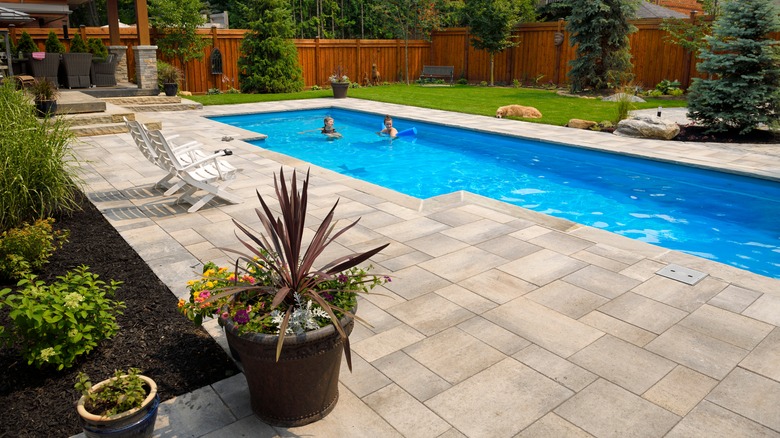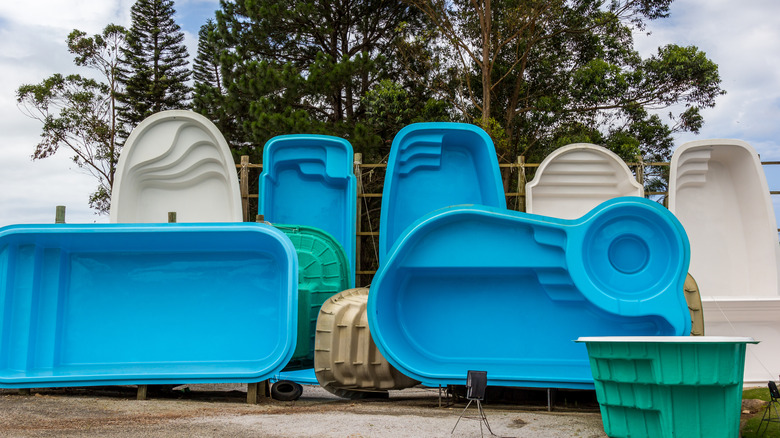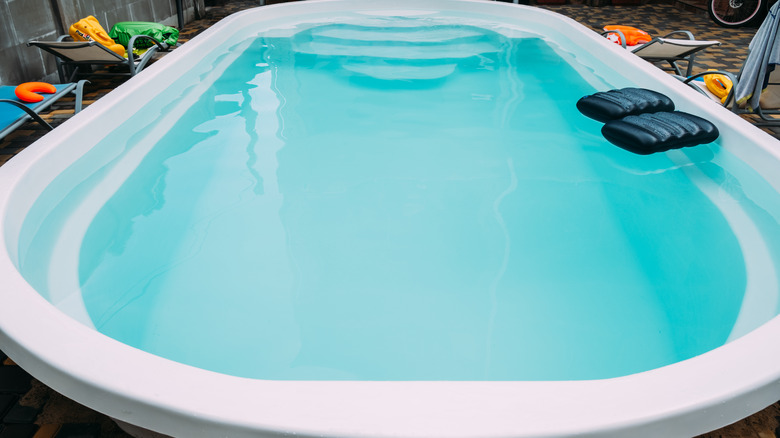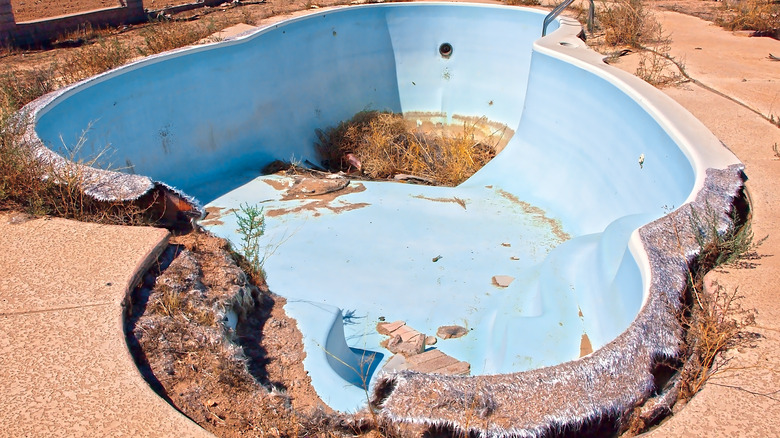The Pros And Cons Of Fiberglass Pools
If you think that your home does not need a pool, wait until summer hits. Seriously, you should get plans to build your pool now because the community pool gets really tight in the summer. Luckily for you, there are a plethora of pools to choose from; there are over 60 pool designs to choose from, as well as a lot of pool types. Earlier, we discussed what to know about natural pools. Today, we are going to talk about a different kind of pool, a new favorite in fact: the fiberglass pool. Is it worth it?
If the first question on your mind is what exactly is a fiberglass pool, we've got you covered. Fiberglass pools are factory-made, one-piece molded units that have multiple layers for durability and structure. Essentially, they consist of reinforced plastic that is made of glass fibers that are coated in resin, according to the experts at GharPedia. But is this new technology worth the hype? Let's weigh it on the balance of pros and cons, shall we?
Pro: low maintenance costs
Alright, so the very first benefit of a fiberglass pool is that it costs way less than its counterparts: concrete pools, vinyl pools, natural pools, etc. The fiberglass pool beats these three hands down when it comes to avoiding holes in your pockets or switching the lever on your bank from green to red, says River Pools and Spas. Additionally, the labor time for installing fiberglass pools is less than other kinds of pools because fiberglass pools are prefabricated, and as such require fewer labor hours.
When it comes to pool maintenance, Hub Spot says that fiberglass pools are naturally resistant to algae and as such, there is no need for regular weekly cleaning or for buying pool products to regulate pH levels. How cool is that? But there is more.
According to the experts over at Emerald Pools and Spas, fiberglass pools require a regular acid wash every three to seven years, unlike the weekly wash that you would otherwise be obliged to give a concrete pool. So, you get to cut out the costs of that one too. Finally, with fiberglass pools, you do not have to schedule the addition of chlorine now and then — meaning they're a better option for people whose skin and hair react to chlorine. And, if you are one of those who do not react to chlorine, your swimsuit does. Get a fiberglass pool installed.
Con: limited design options
We have a joke. What do prefabricated homes have in common with fiberglass pools? They have limited design options. Rather than admit how horrible that joke was, we'll say we were speaking matter-of-factly. We think that the biggest con and turn-off of the fiberglass pool is the fact that the design options are so limited; there isn't any room for customization, and even Pool Pros agrees with us on this one.
The sizes are already rigidly made so that if there is a miscalculation with the set space, you'll have a roughly done pool as there is no room for alterations. Another con of the fiberglass pool that bothers us is the fact that it is hard to DIY. For all of you do-it-yourselfers, we hate to break it to you, but you cannot DIY your way out of this one; you have to get in touch with a professional. But, the downside of this, which River Pools and Spas confirms, is that because this pool is somewhat new, it is even harder to find a skilled professional. Now, that's a bummer. You might have to spend hours on end looking for someone with a proven track record of building fiberglass pools.
Finally, since the pool is portable, transporting it from the factory to its new site is rather dicey because accidents can happen along the way, and dent or break some parts of your fiberglass pool (via Albert Group).
Pro: long-lasting, durable, and sturdy
The second pro of fiberglass pools is how durable they can be. The experts at Thursday Pools write that the fiberglass pool can last up to 30, years give or take — and with proper maintenance, you can expect it to last even longer. Also, since the material for fiberglass pools is molded with reinforced plastic, made of fiberglass, and then further coated in resin, you can be sure that it has enough dimensional stability, effective enough to prevent accidents.
According to Medallion Energy, this material is also moisture-resistant and as such, it prevents the bottom of the pool from getting all slimy and algae infested. Fiberglass is also fire resistant and in addition, the make of fiberglass pools ensures that the surface of the pool is smooth. When compared to the rough surface of concrete pools, this is a huge flex. The surface of the fiberglass pool also prevents slips and unwanted accidents better than other pool types do. Finally, apart from the stability that fiberglass pools provide, you can have your pool base textured, designed with graphics, and more. In terms of design, that is one for the win!
Con: degradation
Just because fiberglass pools require less maintenance doesn't mean they do not require maintenance at all. In fact, according to the experts at Royal Swimming Pools, the fiberglass pool costs way more than the concrete pool for initial installation. However, in the long run, costs are significantly less because these pools don't require heavy maintenance.
In the years leading up to the guaranteed 30-year-warranty of your fiberglass pool, it will be quite common for the gel coating of the fiberglass to affect the quality of the water. The pool also tends to degrade over time and get osmotic blisters. To fix this, the experts at AquaGuard say that you should simply have an expert resurface the pool. Finally, where there are cracks and evidence of color fading, an entire overhaul will suffice (if you have the funds to do one). Or, simply maintain it by resurfacing the pool.




